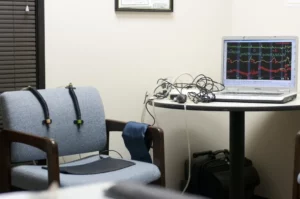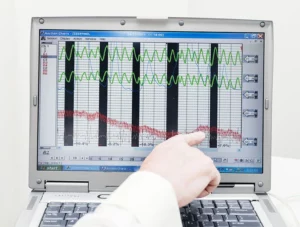If you’re interested in pursuing a career in national security or intelligence, you may have heard about the requirement for a TS/SCI clearance with a polygraph. This type of clearance is necessary for certain positions that require access to highly sensitive information related to national security.
TS/SCI stands for Top Secret/Sensitive Compartmented Information, and it’s the highest level of security clearance that the United States government can grant. This clearance allows you access to classified information that is critical to national safety, and with it comes a great deal of responsibility.

In order to obtain this clearance, you’ll have to go through an extensive background check and investigation process that can take several months or even years to complete. This involves a thorough examination of your personal and professional history, including your education, employment, finances, and any criminal or civil legal issues.
One component of the procedure that can be particularly intimidating is the polygraph exam. It is designed to assess your honesty and integrity by measuring various physiological responses while you answer a series of questions.
The polygraph is just one part of the overall TS/SCI process, but it’s an important one. While it can be nerve-wracking, it’s important to remember that its purpose is not to catch you in a lie but to ensure that you’re trustworthy and able to handle the responsibilities that come with this clearance.
In the following sections, we’ll take a closer look at what exactly the process entails, what the polygraph examination involves, and what you can expect.
Levels of security clearance
There are several types of clearance, Levels are based on the sensitivity of the information and the degree of risk associated with granting access to that information.
The first level is confidential clearance. The background investigation for this clearance is less rigorous than that for a TS/SCI but still requires a thorough review of the applicant’s personal and professional history.
The second level is the secret level. This is granted to individuals who require access to information that, if disclosed, could cause serious damage to national security. The background investigation for such is more extensive than for a confidential and may include interviews with coworkers, neighbors, and other individuals who are familiar with your character and conduct.
The third and highest level is the Top Secret clearance. This is granted to individuals who require access to data that, if disclosed, could cause exceptionally grave damage to national security. The background investigation for Top Secret is the most extensive and may include a polygraph exam and a single-scope background investigation (SSBI), which is the most comprehensive investigation that the government can conduct, in addition to interviews and reviews of financial, criminal, and medical records.
Above Top Secret, there are additional clearance levels that are reserved for individuals who require access to particularly sensitive or compartmented information. These include Special Access Programs (SAP), which are created for specific government projects or programs and require additional screening.
The purpose of the polygraph

During the course of obtaining a TS/SCI, you may be required to take a polygraph. Its role is to determine the accuracy of the information you provided.
The polygraph measures bodily responses that are believed to be indicators of stress and anxiety, which may increase when you are being deceptive.
It’s worthwhile to note that it is not foolproof and there are factors that can influence the results, including mental and physical state, the skill of the examiner, and the nature of the questions being asked.
The TS/SCI Clearance Process
The procedure typically involves the following steps:
- Application: The first step is to complete an application for a security clearance, which will require you to provide personal and professional information, such as your name, date of birth, social security number, employment history, and educational background. You will also be required to disclose any criminal history, drug use, or other potentially disqualifying information.
- Investigation: Once your application has been submitted, a background investigation will be initiated. The investigation will typically include interviews with friends, family members, neighbors, coworkers, and other individuals who may have information about your character and conduct. Additionally, investigators will review your credit history, criminal record, and other public records to determine if there are any red flags that may disqualify you from obtaining the clearance.
- Adjudication: After the investigation is complete, the information gathered will be reviewed by a team of adjudicators, who will determine whether you are eligible for a clearance. Factors that may be considered during the process include your personal conduct, foreign contacts, financial history, and criminal record. If the adjudicators determine that you are eligible for a clearance, you will be granted an interim clearance while the final adjudication process is completed.
- Polygraph Examination: As mentioned, you may be required to pass a polygraph. The goal is to verify the accuracy of the information you provided during the application and investigation process and to identify any potential security concerns. The examination may cover a range of topics, including drug usage, criminal activity, foreign contacts, and other possibly disqualifying information.
- Final Adjudication: Once all of the information has been collected and reviewed, a final decision will be made regarding your eligibility for a clearance. If you are deemed eligible, you will be granted the clearance and will be able to access sensitive information as part of your job duties.
The process can be lengthy depending on the complexity of the investigation and the volume of applicants. Additionally, not everyone who applies will be granted one, as the standards are extremely high.
Who needs a TS/SCI clearance with a polygraph?

It is typically required for roles within the federal government or with private companies that contract with the government.
Here’s an overview of some jobs that may require it:
- Intelligence Analysts: Intelligence analysts who work for government agencies such as the Central Intelligence Agency (CIA), the National Security Agency (NSA), and the Defense Intelligence Agency (DIA), among others.
- Cybersecurity Professionals: Cybersecurity professionals who are responsible for protecting government systems and data from cyber attacks. Including network security, security operations, and security engineering.
- Diplomats and Foreign Service Officers: Diplomats and Foreign Service Officers representing the United States abroad, working to promote American interests and relationships with foreign governments. Including political affairs, economic affairs, and public diplomacy.
- Military Personnel: Many roles within the military require a TS/SCI, particularly those in intelligence, reconnaissance, and special operations.
- Private Contractors: Private companies that contract with the government to provide services and support. They may operate in areas such as information technology, engineering, and consulting.
These are just a few examples. There are many other roles and industries that could require it, depending on the specific nature of the work involved.
Private sector jobs that require this clearance
- Defense contractors, including companies that provide technology and engineering services, often require employees to hold TS/SCI clearance. These companies work on classified government projects and require employees with high-level authorization to access sensitive information.
- Aerospace and aviation Companies that provide space and aviation services, such as aircraft manufacturing and maintenance, may require TS/SCI clearance for employees who work on classified projects.
- Energy and natural resources Private sector companies may require employees to hold TS/SCI.
Common reasons for clearance denial or revocation
One of the most frequent reasons for clearance denial or revocation is personal conduct. This can include a history of criminal activity, drug or alcohol abuse, financial irresponsibility, or other actions that indicate a lack of judgment or reliability. Adverse information about personal conduct can come from a variety of sources, including interviews with references, credit checks, and criminal background checks.
Another reason for denial is foreign contacts or foreign activities. This can include travel, business interests, or foreign relatives. The concern here is that close ties to foreign entities could make you vulnerable to pressure or coercion, or that you could be more likely to engage in espionage or other activities that could compromise security.
A third reason for denial is mental health. While having a mental condition in and of itself does not necessarily disqualify you from obtaining clearance, certain conditions can be disqualifying if they impact judgment or reliability. Examples of potentially disqualifying conditions include bipolar disorder, schizophrenia, and severe depression.
Finally, clearance can be denied if you demonstrate a lack of candor or honesty during the process. This can include intentionally withholding information, providing false information, or failing to disclose information that would be relevant to the clearance decision.
Addressing concerns or issues during the clearance
It is common to have worries or difficulties that arise, and important to address any as soon as possible to ensure a smooth process.
By far, the best way to deal with them is to be upfront and honest. Any falsification or withholding of information can lead to a denial or revocation of your clearance. It is better to disclose anything at the beginning rather than have them discovered later.
It’s also important to obtain any supporting proof that may help mitigate questions. This could include letters of recommendation, financial records, or other documents that show you have taken steps to address any potential troubles. Providing as much facts as possible can help reassure the clearance adjudicators that you are trustworthy and can be granted it.
Myths and Misconceptions
Myth #1: The polygraph is unreliable. There is a common belief that polygraphs are ineffective for determining whether someone is telling the truth or not. However, the truth is that they are a highly effective tool that has been used for decades to screen potential security clearance holders. While it is not infallible, it is an important part of the overall process and very accurate.
Myth #2: You Need to Be a Perfect Candidate to Obtain TS/SCI. Many people believe that they need to have a perfect background in order to obtain a clearance. However, this is not the case. While it is true that certain issues can disqualify you from obtaining one, such as a history of criminal behavior or substance abuse, the screening process is designed to identify those who are suitable rather than to exclude everyone who has ever made a mistake.
Myth #3: Once You Obtain TS/SCI Clearance, You Are Set for Life. Many people believe that after they get a clearance, they are permanently secure and never need to worry about their status again. However, this is not the case. Clearances must be periodically renewed, and any significant changes in background or behavior can result in the revocation.
Maintaining a TS/SCI clearance
Maintaining a clearance requires ongoing effort and diligence. Here are some key aspects to keep in mind:
- Keep your personal life in order: Your clearance can be jeopardized if you engage in illegal or unethical behavior, such as drug use, financial irresponsibility, or activities that could make you vulnerable to blackmail. Be sure to report any significant changes in your personal life to your security officer.
- Report foreign contacts: It’s important to report any contact you have with foreign nationals, including travel to foreign countries, to your security officer. This doesn’t mean you can’t have contact with foreigners, but it’s important to be transparent about it.
- Follow proper security procedures: Make sure you follow proper safety procedures, such as safeguarding classified information and using secure communication methods. Don’t take shortcuts or make exceptions to rules.
- Attend required training: You will be required to attend periodic security training sessions to maintain your clearance. These are designed to keep you up-to-date on security methods and help you identify potential threats.
- Stay current with your finances: Financial problems can be a red flag for security clearance holders. Make sure you pay your bills on time and avoid taking on too much debt. If you do run into financial trouble, report it to your security officer immediately.
Maintaining clearance while facing lifestyle changes
Life is full of changes, and sometimes they can impact your ability to maintain clearance. It is important to understand how these may affect your clearance and what steps you can take to maintain it:
Moving: If you are moving to a new location, you must report your new address as soon as possible. Your security officer will ensure that your clearance is transferred to the appropriate clearance-granting authority. It’s also essential to report any changes in your living situation, such as moving in with a new roommate or buying a new home.
Marriage: If you are getting married, you should report the change in your marital status. This includes any changes in your spouse’s background or foreign contacts. If your spouse is a foreign national, it is especially important to report this as it can impact your clearance eligibility.
Foreign Travel: If you are traveling abroad, your security officer must be informed of your trip arrangements. This includes any personal or business travel outside of the United States, as well as any travel to high-risk countries or regions. He may provide you with additional briefings or training on security protocols and procedures for traveling abroad.
In addition to reporting these, it is equally important to adhere to the security protocols and procedures outlined in your clearance. This includes being cautious about who you share information with, only accessing information on a need-to-know basis, and ensuring that any communication or transmission of information is done in a secure manner.
If you are experiencing any routine changes,be proactive and communicate with your security officer. By doing so, you can ensure that you are taking the necessary steps to maintain your clearance and uphold the highest standards of security and professionalism in your work.
Re-investigation and re-evaluation requirements

To maintain your clearance, you will be required to pass periodic re-investigations and re-evaluations. These are intended to ensure that you continue to meet the eligibility requirements:
- Frequency: The frequency of re-investigations varies depending on the level of clearance and the agency involved. Generally, individuals with a TS/SCI clearance will be subject to a re-investigation every 5 years, although this can vary depending on the circumstances.
- Scope: The scope of a re-evaluation can vary depending on the circumstances. At a minimum, you can expect a review of your personal and professional history, including your financial and criminal background. You may also be required to attend a medical evaluation, a psychological evaluation, and a polygraph examination.
- Notification: You will typically be notified in advance of a scheduled re-investigation. It is important to respond promptly to any requests for information or interviews, as failure to do so could jeopardize your clearance.
You may also be subject to re-evaluation at any time if new information comes to light that could impact your clearance eligibility.
Final Thoughts
Obtaining and maintaining a Top Secret or Sensitive Compartmented Information (TS/SCI) clearance is a rigorous process that requires you to undergo a thorough background check, security investigation, evaluation of character, loyalty, and trustworthiness.
The process includes several types of polygraph examinations that are used to confirm or refute information provided or uncover potential security concerns. While the examination is a crucial part of the clearance process, it is not the only factor considered in determining suitability.
Once granted a TS/SCI clearance, you must be diligent in maintaining its validity by reporting any changes in personal or professional life that may impact eligibility.
All the best!

